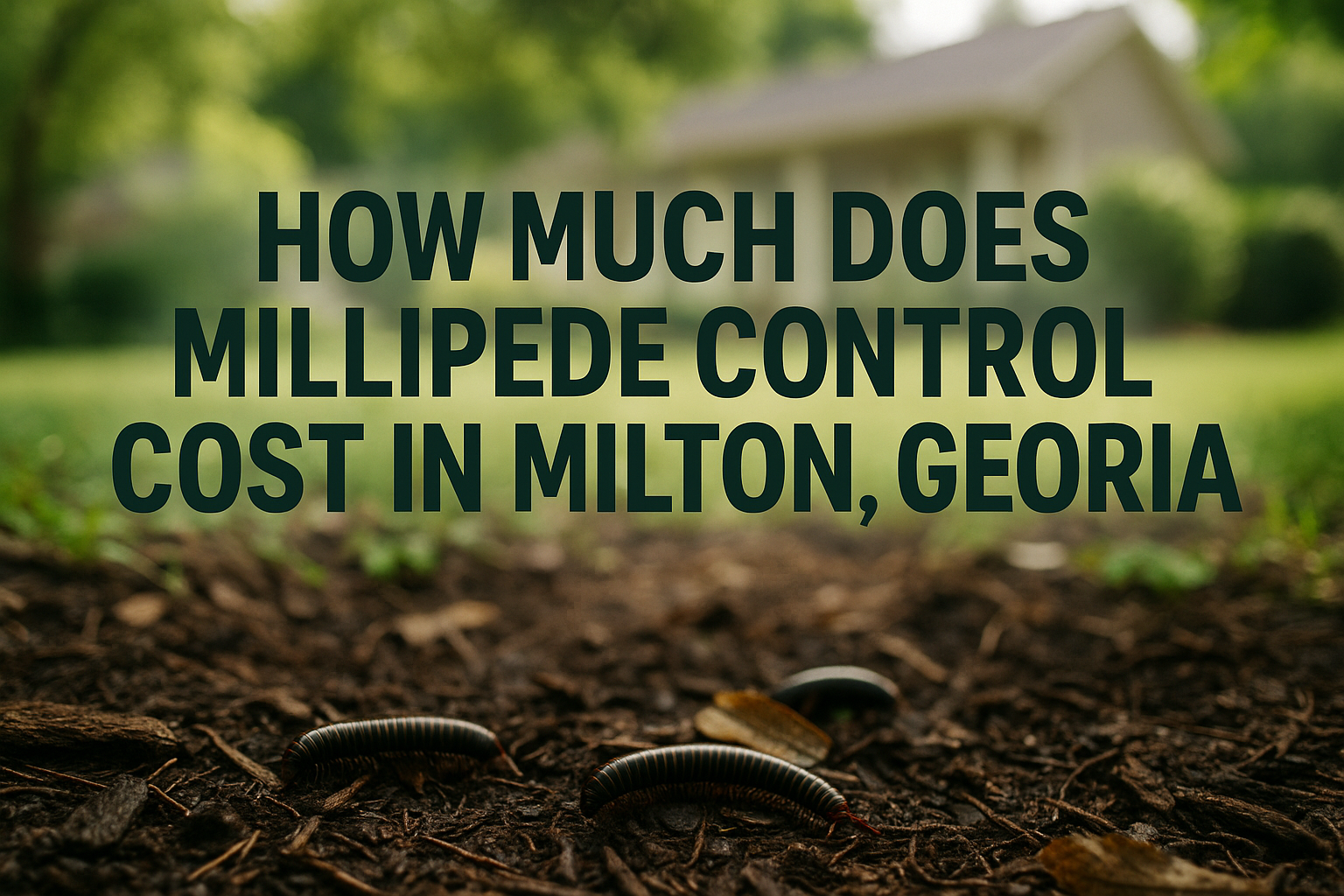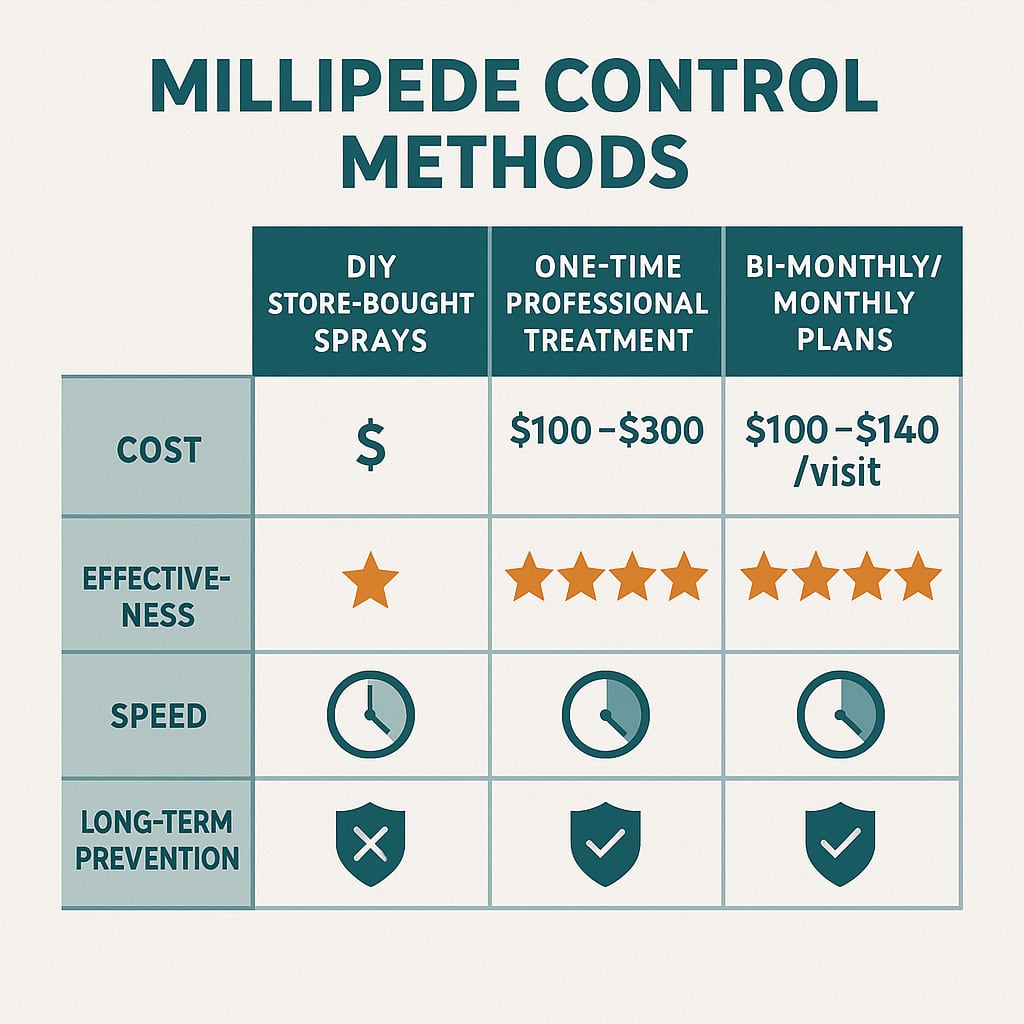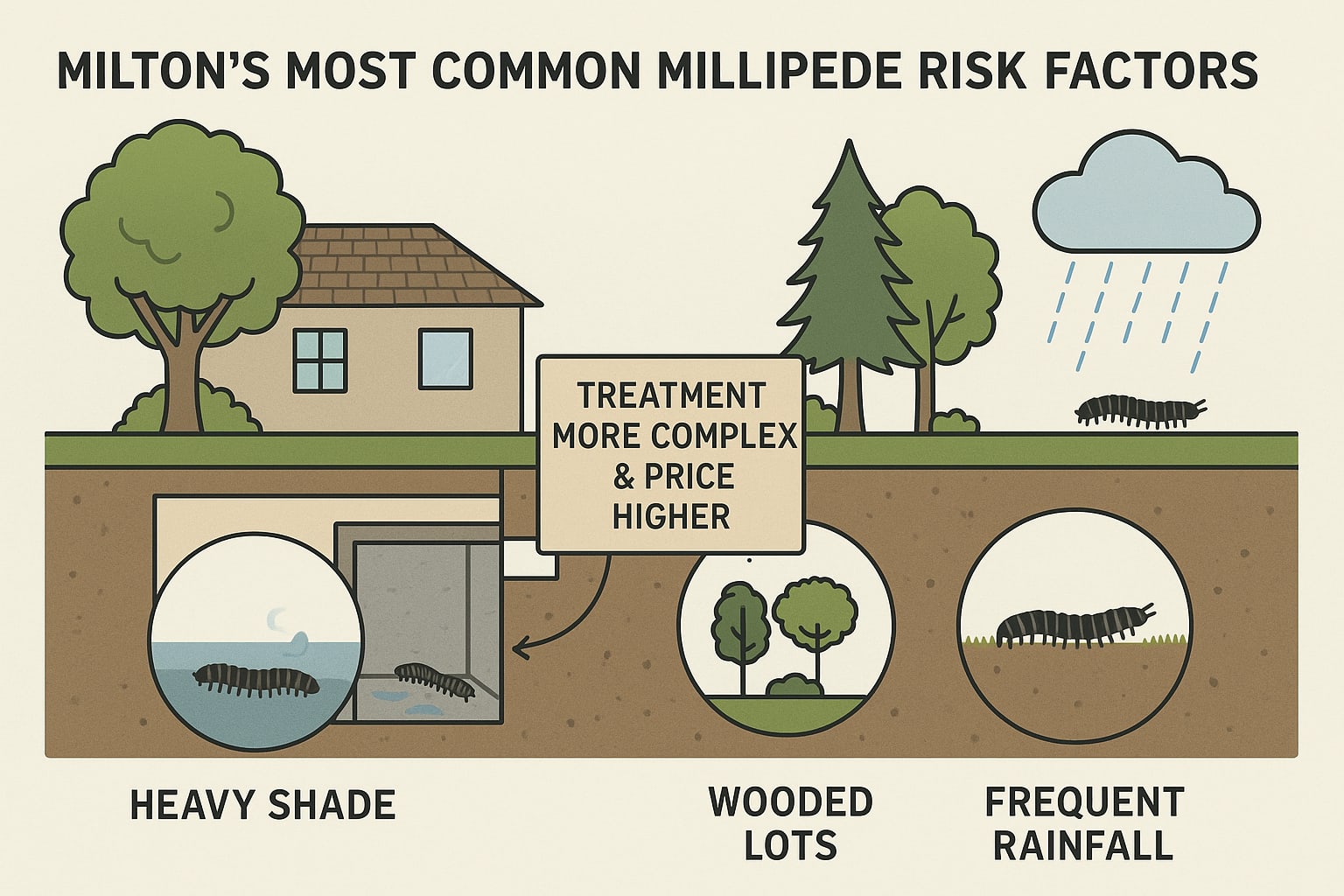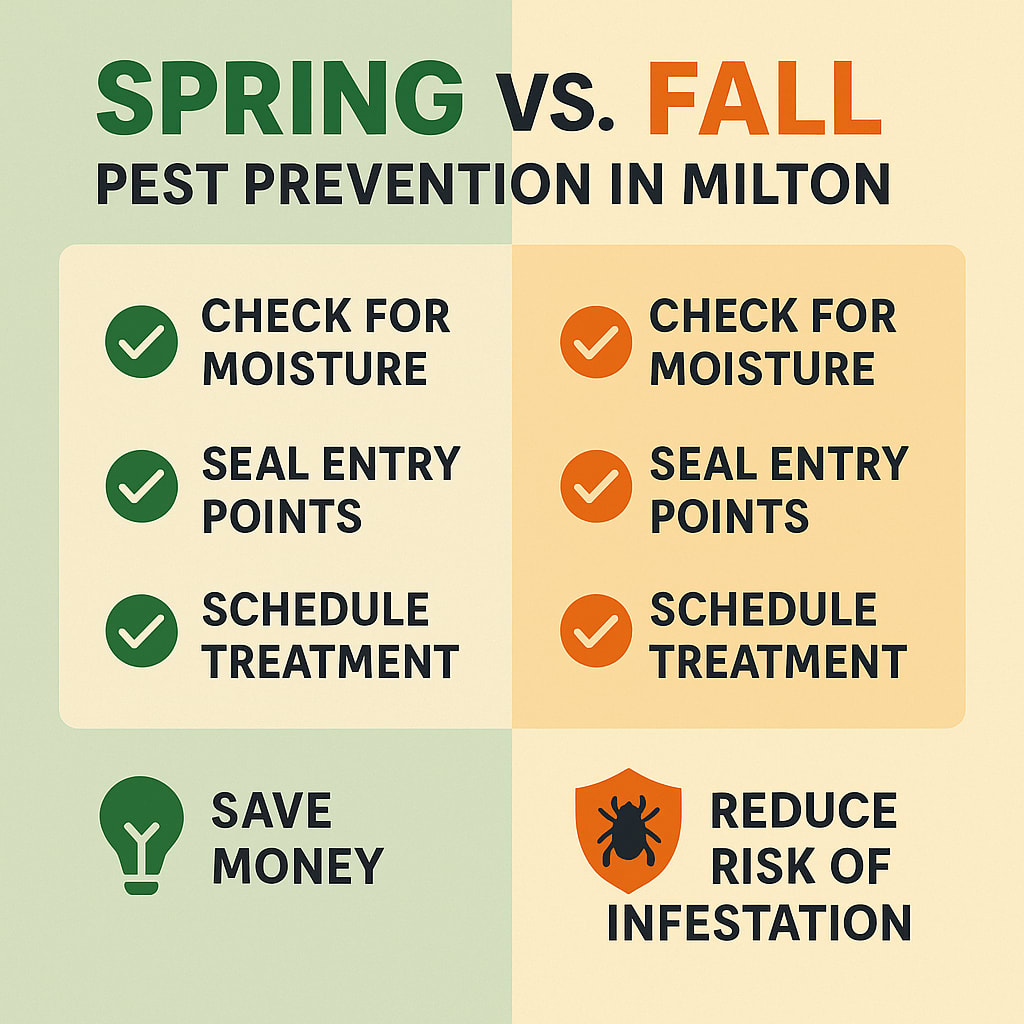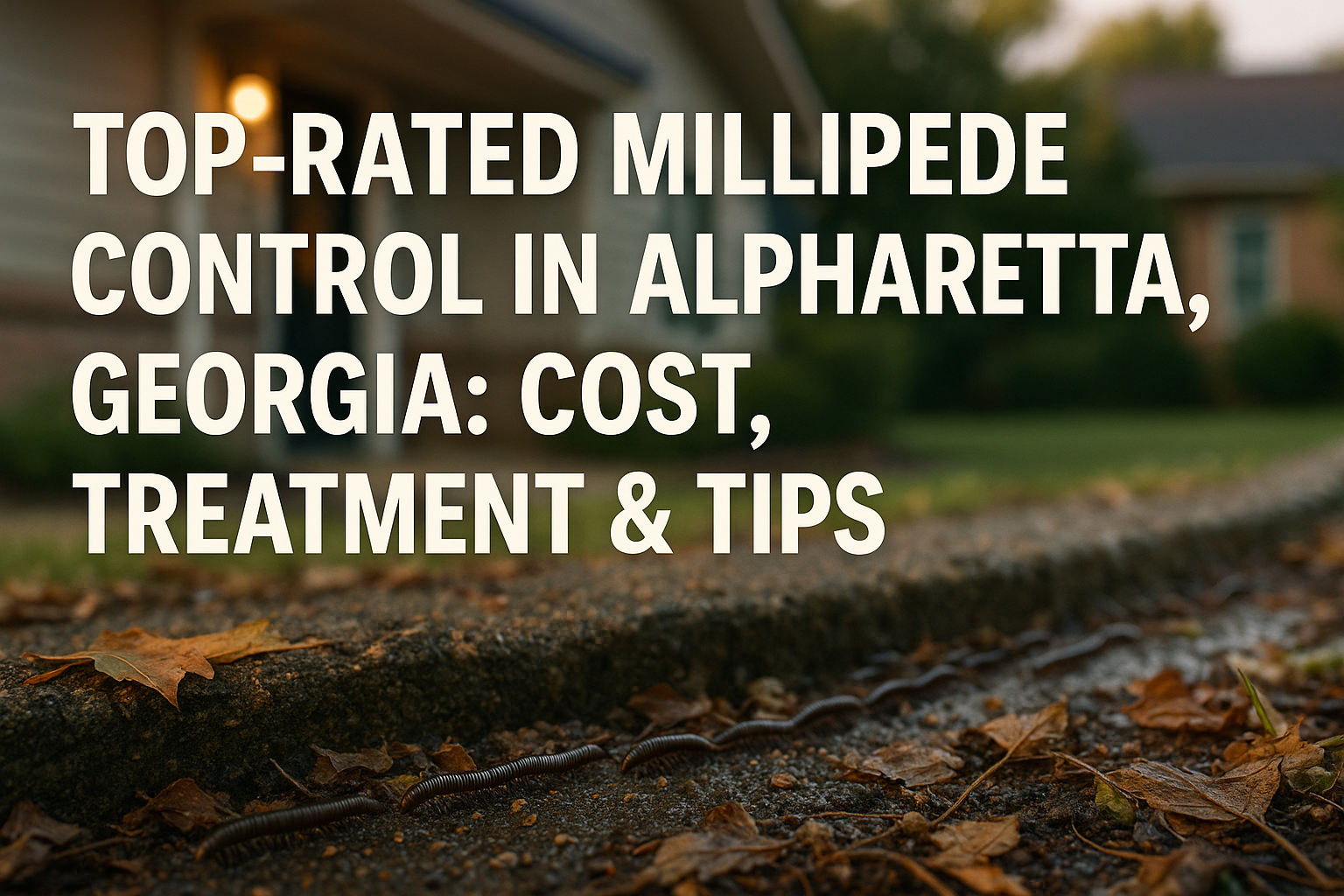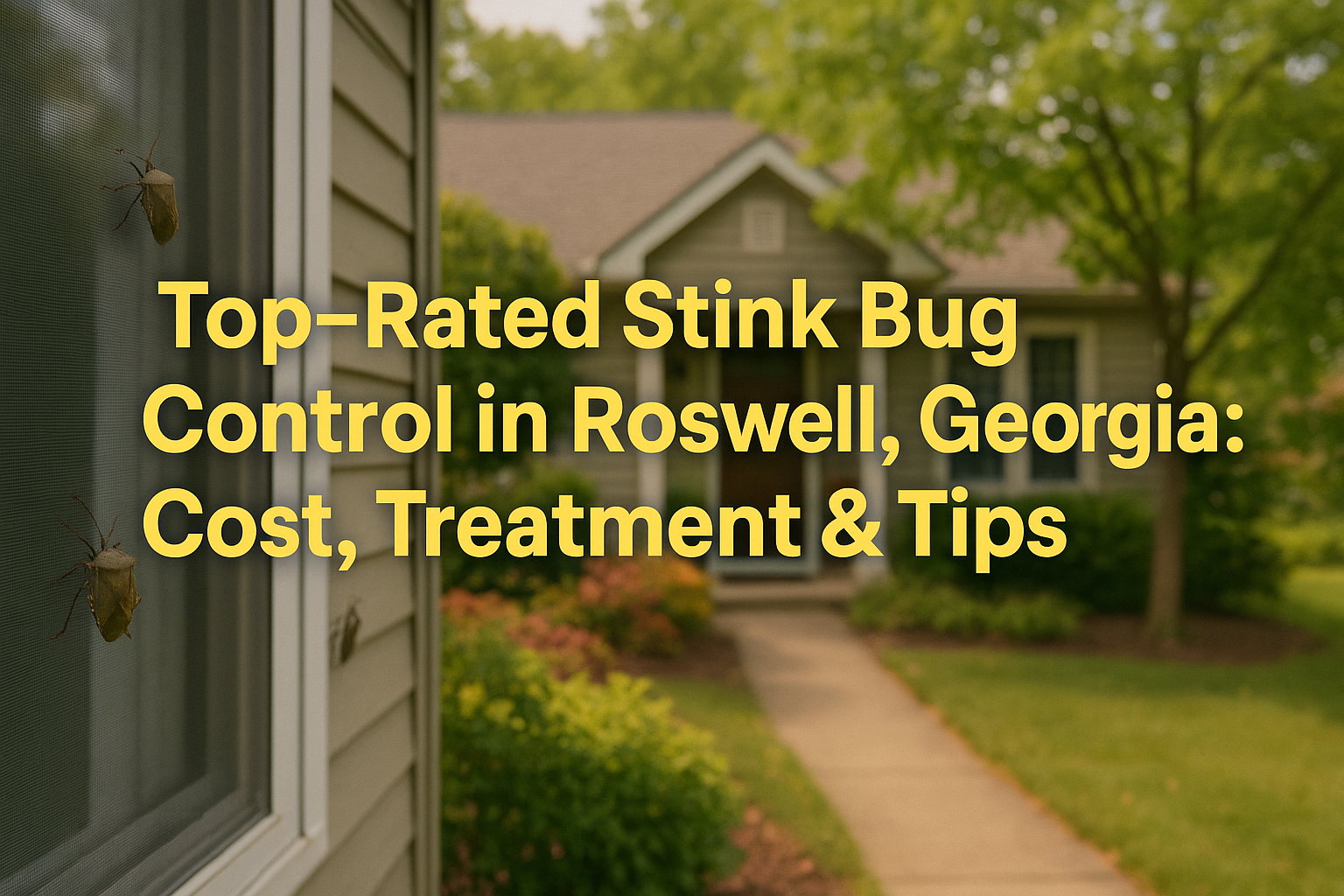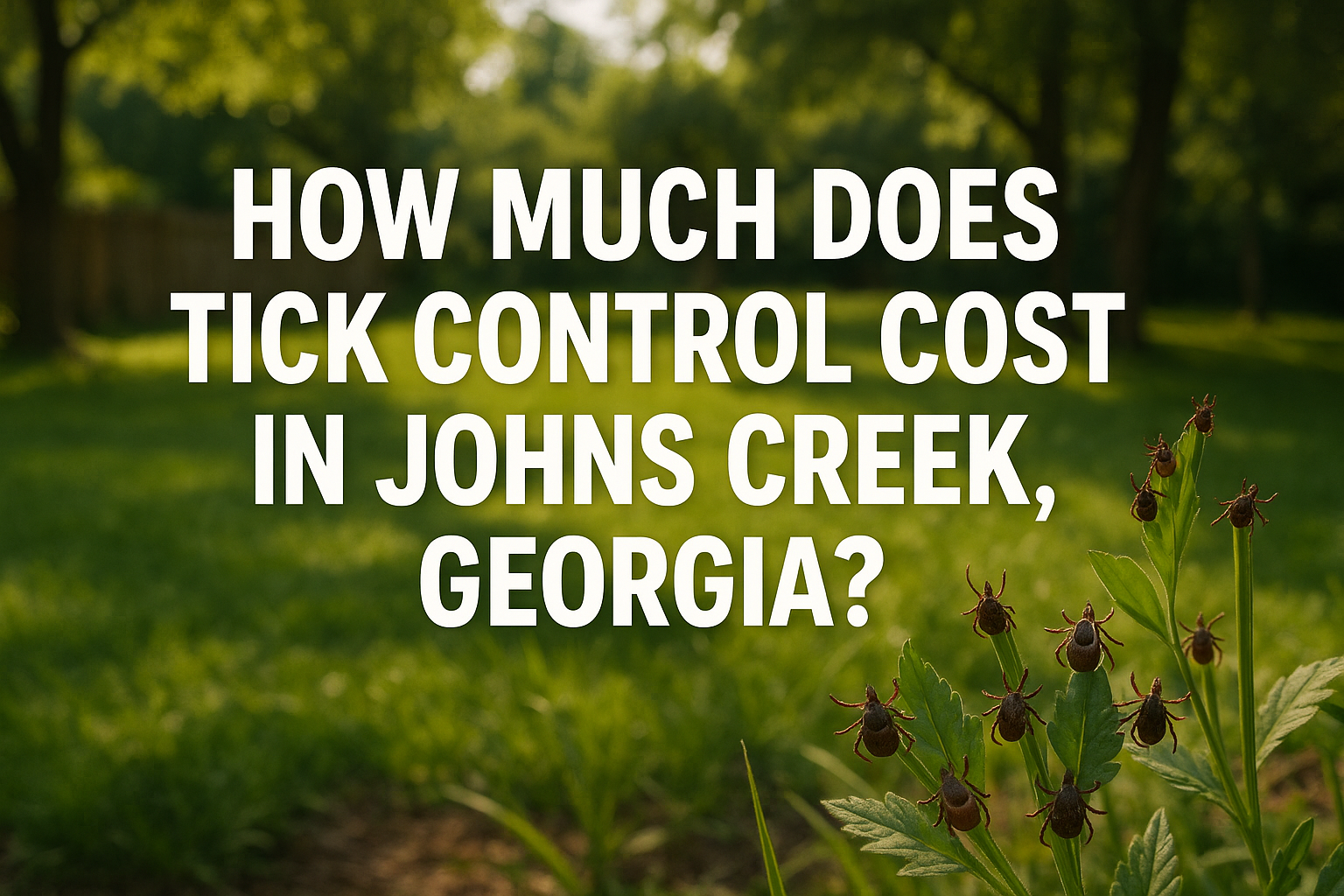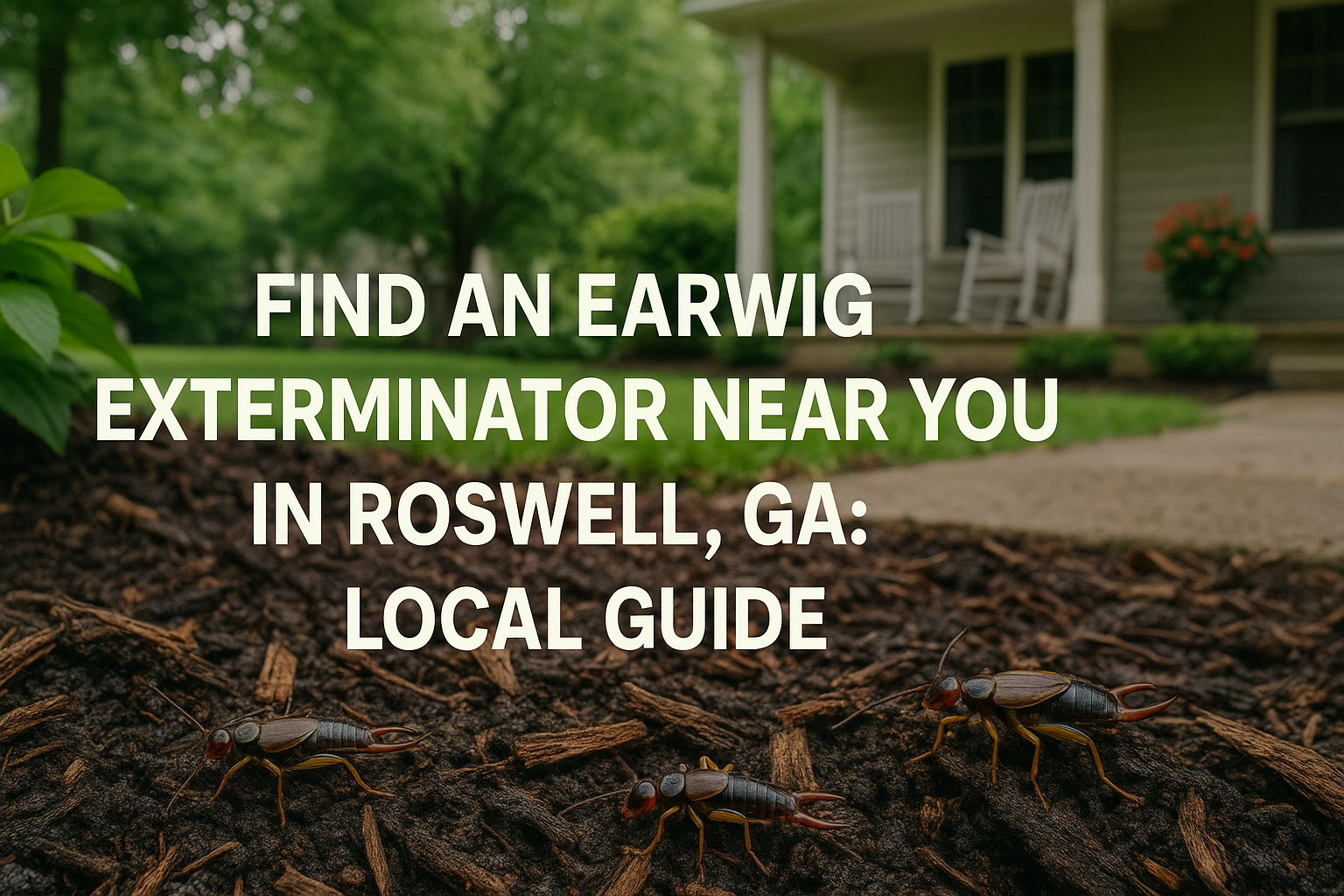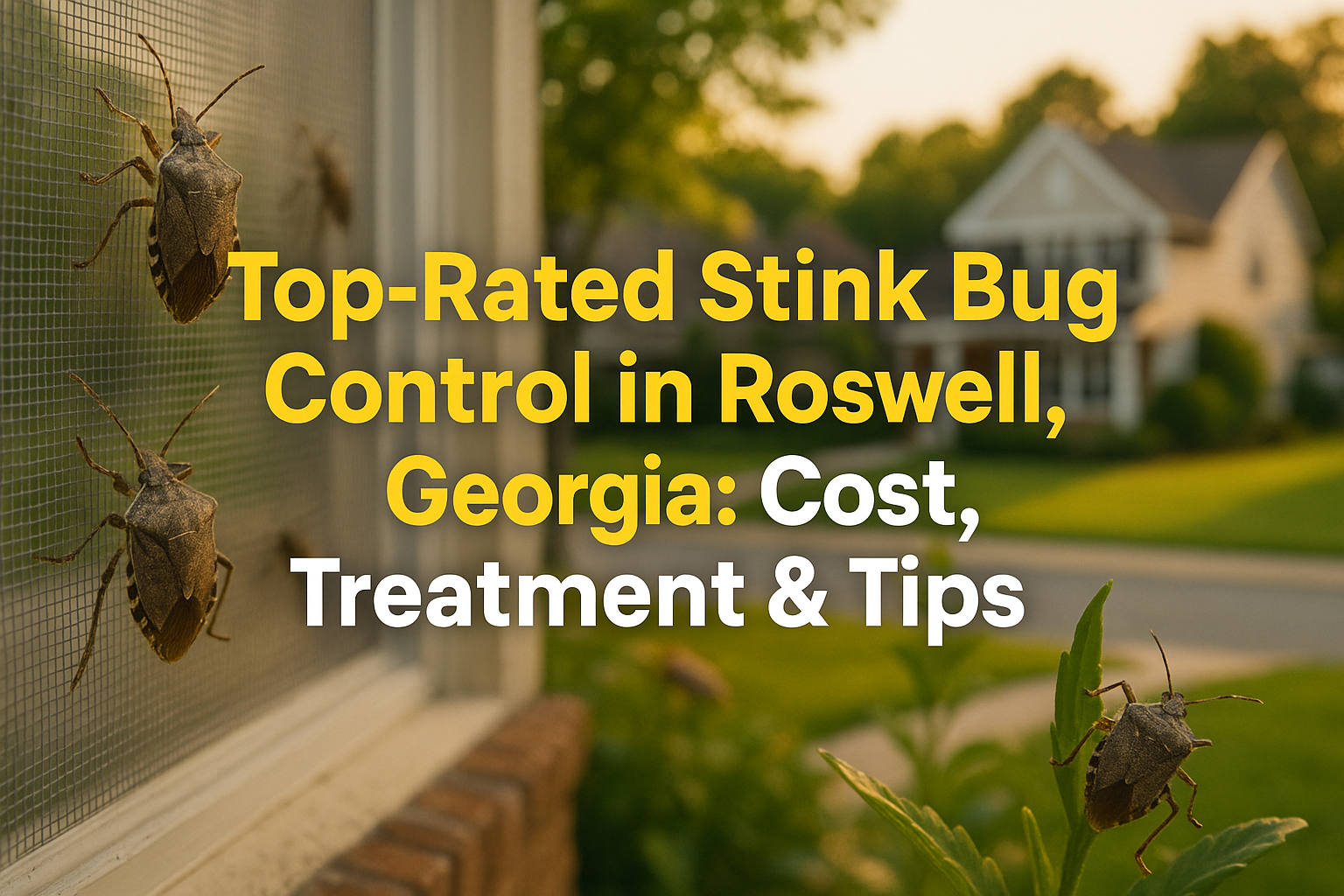Millipede Trouble in Milton: What You Need to Know
If you live in Milton, Georgia, you’ve probably seen those long, skinny bugs squiggling across your basement floor or hiding out in the shady corners of your garage after a stretch of rainy days. Millipedes are no strangers to the neighborhoods around here, and when the weather turns warm and damp—think spring and fall—they like to move right in.
Whether your home is in Crooked Creek or White Columns, these little crawlers start sneaking indoors, looking for a cozy spot—especially after a good rain, when your yard’s mulch holds moisture and shaded areas invite pests. They’re not harmful to people or pets, but let’s be honest, nobody wants a bunch of millipedes turning their rec room or entryway into bug central.
millipede control cost in Milton invasions aren’t just an eyesore. They can make your home feel less clean and comfortable, and if their numbers spike, they’re tough to wrangle back under control by yourself. That’s why many folks around Milton call in the pros. Here’s what you should know about the average cost if you need help: local pest control services (like Anthem Pest Control) typically charge between $100 and $300 for a one-time treatment. If you want to keep millipedes from coming back, ongoing plans usually run $119 to $189 per quarter, or about $100 to $140 for a monthly visit. Prices can vary depending on your home’s size and how tough the infestation is, but that’s the ballpark most Milton families can expect.
The good news is you’ve got options. In this guide, we’re breaking down everything you need to tackle millipedes in Milton: what causes infestations around here, how local weather plays a part, what really drives the cost, and—most importantly—smarter ways to keep these pests out for good without overspending. If you’re tired of squishing bugs or vacuuming up lines of millipedes, keep reading. Finding the right solution is easier (and probably more affordable) than you think.
What Goes Into Millipede Control Costs in Milton, GA?
Let’s be real: every home and millipede issue in Milton is a little different, which means the price tag for pest control can swing quite a bit. If you’ve got a spacious home—think those larger properties over by North Valley or Providence Lake—you’ll likely pay more than someone in a smaller place. Bigger homes and yards just need more time, product, and hands-on attention from your pest pro.
The next big factor is the level of the infestation. If you’re only seeing a couple of millipedes now and then, that’s a quick fix and likely on the lower end of the cost range. But if you’ve got clusters of them sneaking in every time it rains or notice repeat problems every year, a pest company will often recommend more intensive treatments or even follow-up visits to really get ahead of the issue. And yes—more service does mean a bit more cost.
There’s also a difference in price depending on who you hire and what kind of approach they use. Companies like Anthem Pest Control, for example, practice Integrated Pest Management (IPM), which is a more thorough, prevention-focused style of pest control. It might cost a touch more up front, but the results tend to last longer—and that means fewer surprises down the road. You can see a full breakdown of costs in their guide if you want to dive deeper.
Your home’s layout and features also play into things. Finished basements (millipedes love that cool, damp space), lots of landscaping, or newly renovated areas can make treatment more involved for your provider. More hiding spots simply mean extra work to get them all covered.
To give you a real-world idea, here’s what most Milton homeowners should expect to pay for millipede control:
- One-time visit (1,500 sq. ft. home): $100 – $300
- Quarterly prevention service: $119 – $189 per quarter
- Monthly or bi-monthly plans: $100 – $140 per visit
Every situation is unique, so a trusted local provider will usually inspect your place and help customize a plan that fits your needs and budget. And if you want to make sure you’re paying a fair price—or just want a better idea of what goes into those numbers—Anthem Pest Control’s cost guide has it all laid out in plain English.
What Goes Into Millipede Control Costs in Milton, GA?
Let’s be real: every home and millipede issue in Milton is a little different, which means the price tag for pest control can swing quite a bit. If you’ve got a spacious home—think those larger properties over by North Valley or Providence Lake—you’ll likely pay more than someone in a smaller place. Bigger homes and yards just need more time, product, and hands-on attention from your pest pro.
The next big factor is the level of the infestation. If you’re only seeing a couple of millipedes now and then, that’s a quick fix and likely on the lower end of the cost range. But if you’ve got clusters of them sneaking in every time it rains or notice repeat problems every year, a pest company will often recommend more intensive treatments or even follow-up visits to really get ahead of the issue. And yes—more service does mean a bit more cost.
There’s also a difference in price depending on who you hire and what kind of approach they use. Companies like Anthem Pest Control, for example, practice Integrated Pest Management (IPM), which is a more thorough, prevention-focused style of pest control. It might cost a touch more up front, but the results tend to last longer—and that means fewer surprises down the road. You can see a full breakdown of costs in their guide if you want to dive deeper.
Your home’s layout and features also play into things. Finished basements (millipedes love that cool, damp space), lots of landscaping, or newly renovated areas can make treatment more involved for your provider. More hiding spots simply mean extra work to get them all covered.
To give you a real-world idea, here’s what most Milton homeowners should expect to pay for millipede control:
- One-time visit (1,500 sq. ft. home): $100 – $300
- Quarterly prevention service: $119 – $189 per quarter
- Monthly or bi-monthly plans: $100 – $140 per visit
Every situation is unique, so a trusted local provider will usually inspect your place and help customize a plan that fits your needs and budget. And if you want to make sure you’re paying a fair price—or just want a better idea of what goes into those numbers—Anthem Pest Control’s cost guide has it all laid out in plain English.
Why Millipedes Love Milton Yards—and What That Means for Your Home
If you’ve noticed millipedes creeping into your basement or parading along your foundation after a rainy spell in Milton, you’re not alone. Our local weather—think long, humid summers and wet transition seasons—practically rolls out the red carpet for these moisture-loving critters. After heavy rain, the earth around homes stays damp just long enough for millipedes to breed and wander, especially if you’re surrounded by shaded landscaping or nestled near those winding green corridors off Birmingham Highway.
Let’s talk property quirks that can invite even more of these uninvited guests. Got mature trees, thick shrubs, or a neighbor’s wild garden? These lush spots hold lots of leaf litter and mulch—a buffet and shelter for millipedes. Homes with drainage problems are even more vulnerable. Low-lying yards and clogged gutters push that musty moisture right up against your foundation, making it easy for millipedes to move in whenever things get soggy.
If you own an older property—maybe with a drafty crawlspace, unfinished basement, or a foundation showing its age—it’s an open invitation for millipedes. They only need the tiniest crack to slip in, especially in homes that retain ground moisture. But new builds aren’t always safe either, particularly those springing up near wooded lots like the Triple Crown neighborhood. Disturbed soil from construction and upturned landscaping can temporarily raise moisture and provide fresh hunting grounds for millipedes looking for their next hangout.
All these local factors mean that fighting a millipede invasion in Milton isn’t a simple, one-size-fits-all job. Some situations call for more time and specialized treatment strategies—maybe more repeat visits or targeted perimeter work. The unique mix of house age, yard features, and neighborhood greenspace can drive both the complexity and the cost of getting things under control. It’s why a local approach—tailored to your property’s quirks and Milton’s environment—is so important if you want real, lasting results.
Up next: take a look at our graphic breaking down just how these Milton-specific conditions shape your pest control plan—and what to expect from your investment.
Keep Millipedes Out: Smart Prevention for Milton Homeowners
Dealing with millipedes sneaking into your home isn’t anyone’s idea of fun, but a little bit of regular care around your property goes a long way. If you live in Milton—especially in neighborhoods like The Manor or Deerfield Green—simple steps can help you avoid repeat invasions and keep pest control costs down.
- Control Moisture: Millipedes love damp places. Check for leaky pipes and fix them fast, keep your gutters free of debris, and make sure your downspouts point away from your foundation. Water pooling at the base of your home is like rolling out the welcome mat for these pests.
- Keep Your Yard Tidy: Decaying leaves, mulch, and other yard debris provide perfect hideouts for millipedes. Regularly rake up leaves, trim shrubs, and clear out mulch from high-moisture zones, especially if you’ve got a lot of shade by driveways or patio slabs.
- Seal Entry Points: Millipedes are tiny, but they’ll find their way indoors if they can. Inspect for cracks along your foundation, install door sweeps, and make sure crawlspace vents are working properly to keep unwanted guests outside.
- Seasonal Checks: Humid months in Milton are when millipedes become most active. Mark your calendar for home inspections and moisture checks as the weather warms up. Early detection means you’ll spend less time (and money) dealing with big problems down the road.
Think of these simple strategies as an investment in your peace of mind—and your wallet. A little effort each season can make a big difference, and staying ahead of millipedes is a whole lot cheaper than fighting an infestation after it gets rolling.
Watch for our handy checklist coming soon, so you can easily stay on top of pest prevention all year long.
Timing Matters for Millipede Control in Milton
If you’ve noticed millipedes turning up around your home in Milton after a bout of rain, you’re not alone. These pests thrive when it’s damp—usually right after those heavy spring or early fall showers roll through. That’s when they start popping up in basements, crawlspaces, and across patios, leading folks in local neighborhoods like Cambridge and Lake Haven to reach for the phone and schedule service.
Here’s something you might not have considered: seasonality isn’t just about when millipedes are active, it also affects how well your control efforts work and what you’ll pay. When activity spikes—typically late spring and early fall—there’s a rush of calls, which can drive up prices and book up appointments fast. Waiting too long during these periods could mean longer wait times (and seeing more crawlers than you’d like).
For the most effective results, it’s smart to strike while millipedes are moving. Treating when their activity peaks means barrier sprays and other treatments get right to the source, keeping those populations in check before they multiply.
But what about winter? That’s your golden window for prepping your home. Activity drops as things dry out and chill, making winter perfect for preventive treatments or sealing up those tiny gaps around your foundation. You’ll usually find more open appointment slots, and you might snag a better deal with off-season pricing. Think of it as a proactive move—spend a little in winter, save yourself a headache (and some cash) when spring rains return.
- Spring/Fall: Highest millipede activity, quick action brings faster relief and maximized protection—but be ready for increased demand.
- Winter: Less activity means it’s the ideal season for preventive work and property upgrades—often at a lower cost.
So, if you want to outsmart these pests, timing is key. Plan your service around Milton’s seasonal patterns and you’ll cut costs, reduce hassle, and keep millipedes at bay all year round.
Tip: Check the seasonal comparison graphic above for the best times to book and more ways to stretch your pest control budget.
Stop Millipedes Before They Move In—With No Strings Attached
Don’t let millipedes take over your Milton home. Get ahead of the problem with Anthem Pest Control’s free, no-obligation property assessment. Whether you’re in Providence Lake, White Columns, or anywhere else in Milton, our local experts are here to help—no pressure, just honest advice.
Our professional team will check your home inside and out, uncovering exactly where those millipedes are hiding and what’s inviting them in. We craft solutions that fit your space and your budget—no surprise fees, no pushy sales talk.
Ready to see how quick, affordable, and effective real pest control can be? Give us a call at 877-3718-5196 or visit anthempest.com for your fast, free quote today. Let’s give you the peace of mind you deserve, right here in Milton!
Millipede Control FAQs – What Every Milton Homeowner Wants to Know
- Why do I suddenly see millipedes inside my house?
If you’re finding millipedes crawling around, especially after rain, you’re not alone. Millipedes love damp, protected spots and often wander indoors through tiny gaps in your foundation when the ground outside gets too soggy. - Should I be worried about millipedes?
The good news is, millipedes aren’t out to cause harm. They don’t bite or sting people or pets. The biggest issue? When disturbed, they can let loose a stinky odor and sometimes leave stains behind. - How fast can a pest pro get rid of them?
Once your pest control expert does their thing, most infestations clear up in just a day or two. You won’t be playing the waiting game for long. - Is treatment safe for my pets and family?
Safety comes first. Anthem Pest and other proven professionals use EPA-registered treatments that are applied with care. You’ll probably just need to keep your pets and kids away from treated areas for a little while—your technician will let you know how long. - Is a recurring service really worth it?
If your home is prone to dampness or you’ve got lots of landscaping, regular pest service is a smart move. It helps keep millipedes and other pests away consistently—and it’s a predictable cost, so no surprises. - How much does it cost just to have someone take a look?
Good news for your budget: many local pros, including Anthem Pest, offer a free initial inspection or estimate. So, there’s no risk in getting a professional set of eyes on your situation. - Anything I should do before the pest tech shows up?
You can help your pest specialist by removing clutter, sealing up any obvious cracks or holes, and clearing leaves or mulch away from your home’s foundation. These quick steps make it easier to treat and prevent millipede invasions.
Got more questions about millipedes or want fast help? Local experts in Milton are just a call away—don’t let creepy-crawlers make themselves at home!

